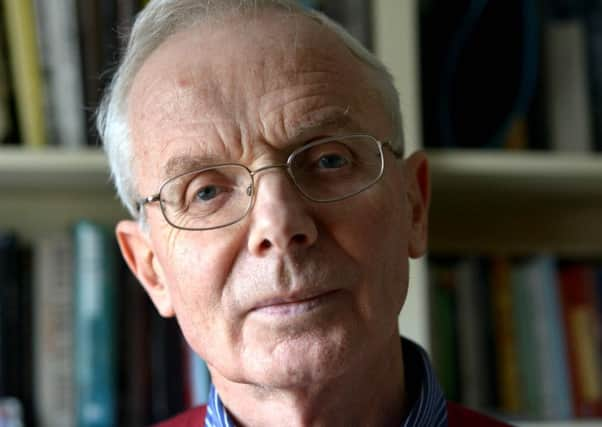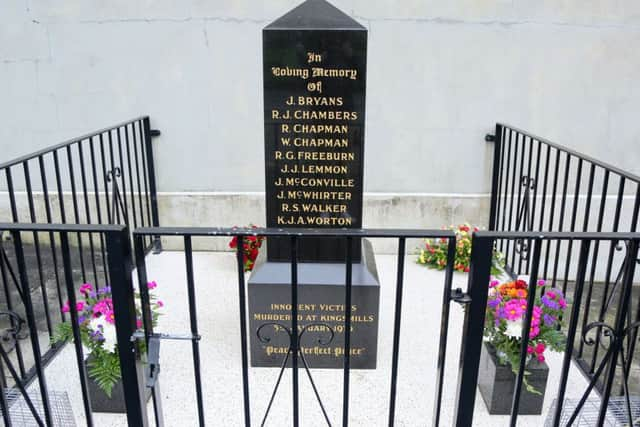Kingsmills inquest: IRA '˜embarrassed' about sectarian murders


The claim was made by professor emeritus of politics at Ulster University Henry Patterson, author of ‘Ireland’s Violent Frontier, The Border and Anglo-Irish Relations During the Troubles’.
Ten Protestant civilians were killed by the IRA as they returned home from work in January 1976 near Kingsmills in south Armagh.
Advertisement
Hide AdAdvertisement
Hide AdAsked at the inquest into the killings yesterday why IRA used the nom de plume of the South Armagh Republican Action Force (SARAF) for the attack, Prof Patterson said there was an “ideological” reason, which he said was illustrated by the words of the father of Irish republicanism – Protestant Wolfe Tone – whom he quoted as aspiring to “unite the whole people of Ireland ... Protestant, Catholic, and dissenter”.


It was difficult for the IRA to have carried out such a sectarian atrocity while its own ideology claimed to be “non-sectarian”, he said.
“It was clearly an embarrassment then and I think it continues to be an embarrassment today.”
As a result some republicans “still deny the IRA carried out Kingsmills”, he said.
Advertisement
Hide AdAdvertisement
Hide Ad“The use of a nom de plume by loyalists and republicans was a way of avoiding responsibility for targeting innocent people,” Prof Patterson said, while carefully rejecting the paramilitary concept of ‘legitimate targets’.


It was “essential” in maintaining a level of support in their respective communities so they could continue to operate “while avoiding being connected to brutal atrocities”.
There had been claims that IRA army council members Seamus Twomey and Brian Keenan were behind Kingsmills, he said, but he regarded these as “speculative”.
However, he noted that although the IRA had been on ceasefire at the time, it had issued revised orders for members which allowed them to engage in “retaliatory and defensive actions” in response to mounting loyalist violence.
Advertisement
Hide AdAdvertisement
Hide AdSo the Kingsmills gunmen “may have thought they were acting within revised IRA army council orders issued earlier that year”, he added.
Prof Patterson said the year before Kingsmills was one of the worst of the Troubles – with 267 deaths – despite a ceasefire between the IRA and security forces.
There was much media speculation about a British withdrawal from Northern Ireland, which prompted a campaign of sectarian murder by the UDA and UVF, followed by the same from the IRA.
In April 1975 the IRA army council issued new ceasefire orders allowing IRA units to open fire in “retaliatory and defensive actions”.
Advertisement
Hide AdAdvertisement
Hide AdThe UVF bombed a pub on the New Lodge Road after which the IRA launched attacks on the Mountainview Tavern on the Shankill Road and Tullyvallen Orange Hall in south Armagh – without claiming responsibility.
However, the IRA “cryptically hinted at responsibility” for Kingsmills weeks after the attack, he said, when it stated in Republican News: “If the loyalist elements responsible for over 300 sectarian assassinations in the past four years stop such killings now, then the question of retaliation from whatever source will not arise.”
The UK considered the Fine Gael-Labour coalition Irish government of 1973-1977 to be a distinct improvement on its predecessor Fianna Fail, but there was still “considerable frustration” at the ease with which the IRA could use the border to escape to the “safe haven” after attacks, he said.
Taoiseach Liam Cosgrove and ministers were “fierce opponents” of the IRA but “were reluctant to be seen to be cooperating with the security authorities in Northern Ireland” which was labelled “collaboration” by Sinn Fein and Fianna Fail.
Advertisement
Hide AdAdvertisement
Hide Ad“This ensured that the refusal to extradite those wanted for terrorist offences in the North – a long-standing position – was maintained during this period.” The unarmed Garda feared helping the UK security forces would impact their careers, he said.
• The inquest sits again next Wednesday for an update on PSNI investigations.